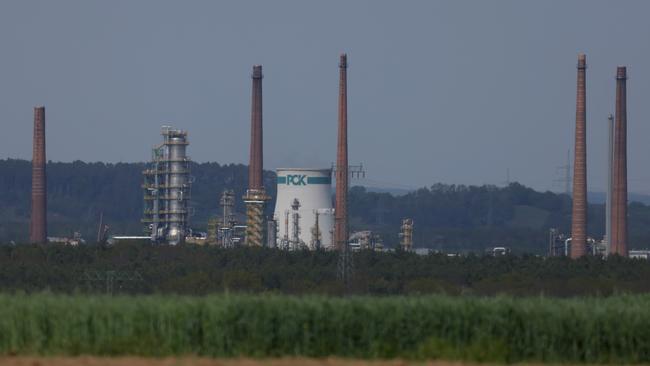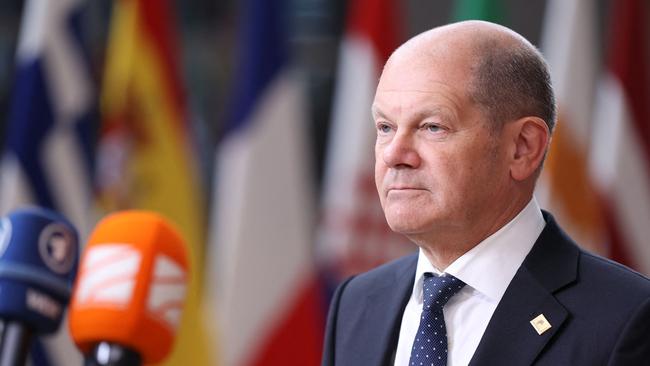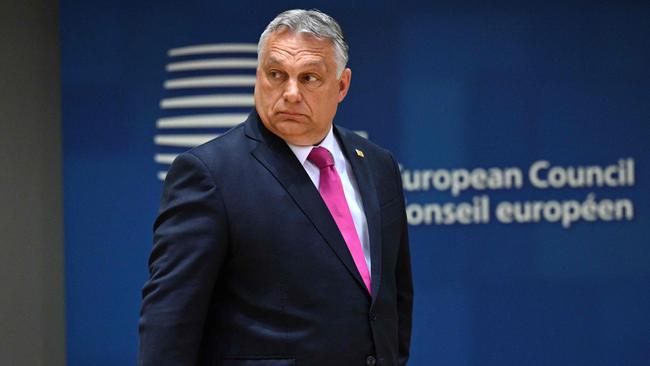Bloc’s action over the Ukraine invasion would include exemption for oil delivered by pipelines
Compromise plan exempts oil delivered by pipeline, but by end of year will cover 90pc of previous Russian oil imports.

The European Union said for the first time that it would impose an oil embargo on Russia over its invasion of Ukraine, taking a big step forward in an economic fight against Moscow that is already reverberating in global markets.
The embargo would include an exemption for oil delivered from Russia via pipelines, an amount that makes up one-third of EU oil purchases from the country.
EU officials said that by the end of the year, the embargo would cover 90% of previous Russian oil imports.
Earlier, oil prices rose to their highest level in more than two months amid prospects for an EU agreement to curtail purchases of Russian oil, combined with China’s tentative emergence from Covid-19 shutdowns.
EU officials for almost two months have haggled over how to constrict energy imports from Russia, for which the bloc pays tens of billions of dollars monthly. European leaders have declared their eagerness to stop funding the Russian government and its ability to wage war in Ukraine. But reliance on Russian gas and oil in many EU countries has impeded those efforts.
Zelensky’s warning
Ukrainian President Volodymyr Zelensky, addressing the EU summit by video Monday evening, told the leaders that “all quarrels in Europe must end” because internal discord “only encourages Russia to put more and more pressure on you, on the whole of Europe.”
Underlying the EU debate is concern that the public support for sanctions could weaken if an oil embargo drives already high energy bills even higher, hitting a European economy still recovering from the coronavirus pandemic.
Germany, the EU’s biggest economy, depends heavily on imports of Russian natural gas, which flows through pipelines. Berlin and some other capitals have said they can’t quickly replace plentiful Russian gas.

Coming into the summit, German Chancellor Olaf Scholz said he was confident the bloc would find a consensus on adopting an oil embargo in the coming hours. European Commission President Ursula von der Leyen, in contrast, struck a more cautious note, saying an exemption for countries who import oil by pipeline wasn’t yet agreed.
“We’ve now basically solved all the issues but one, and this is the question of crude oil via pipeline,” said Ms. von der Leyen, who oversees the EU’s executive arm. “I have not-too-high expectations that we are going to solve it in the next 48 hours but thereafter.”
Hungary baulks at full ban
Many of the EU’s 27 countries could more easily stop importing oil from Russia, which is imported both through pipelines and by ship. But landlocked Hungary has baulked at such a ban, saying the economic pain would be too great. Hungarian Prime Minister Viktor Orban on his arrival at the summit was less upbeat than Mr. Scholz.
“There is no compromise at this moment at all,” Mr. Orban said. “There is no agreement at all.”
EU officials over recent weeks have held protracted negotiations to outline an oil embargo that could win support from Mr. Orban, who has close ties to Russian President Vladimir Putin. The plans now centre on banning Russian oil delivered by ship, which accounts for roughly two-thirds of EU imports of Russian oil, and postpone an embargo on Russian pipeline oil.
Mr. Orban, who has a number of disputes with the bloc on unrelated issues, has repeatedly raised objections to the proposed embargo, such as the fact that the pipeline connection runs through potential war zones in Ukraine. Hungary has refused to join those providing military aid to Ukraine, angering its traditional allies in Europe. Some other EU countries, meanwhile, objected to granting Hungary favours.

Exempting pipeline oil, Mr. Orban said, “is a good approach, but we need a guarantee that in the case of an accident with a pipeline running through Ukraine … we have to have the right to get Russian oil from other sources. If we get it, it’s fine.”
An EU ban, even with an exemption on pipeline imports, would amount to a significant blow to Russia’s ability to cash in on its prize commodity. As of 2020, about three-quarters of the 2.8 million barrels in crude Russia exported to Europe each day arrived by ship, according to Bruegel, a think tank.
Germany committed
Germany, which imports Russian oil through the northern branch of the Druzhba pipeline, has committed to replacing that crude with alternative supplies. For Russia, that leaves Hungary, the Czech Republic and Slovakia, which import just 250,000 barrels a day of oil through the southern branch of the pipe, according to the International Energy Agency.
Kristine Petrosyan, an IEA analyst, said Russia would struggle to divert all the oil that had flowed to Europe on ships to buyers in Asia. “I don’t think they can reallocate everything,” she said, adding that the voyage from Russia’s Baltic-sea ports to China takes about 60 days, much longer than the runs to European refineries.
At the EU summit, the oil embargo wasn’t on the official agenda but became a dominant topic due to Mr. Orban’s resistance.
Food new focus
Food security will be a new focus for EU leaders, as a result of Russia’s blockading of Ukrainian ports, which has cut off exports from the agricultural powerhouse. Countries in the Middle East and Africa are suffering badly from shortages of Ukrainian grain, food oils and other products.
EU leaders are also expected to sign off a €9 billion, or about $9.7 billion, mix of loans and grants for Ukraine, which will go toward helping Kyiv pay short-term bills in the coming months and matches U.S. aid to the country.
EU leaders are looking at ways to develop land routes to get Ukrainian produce to Western European ports and out to the world, although no major decisions are expected at the summit. The issue is vital both for feeding hungry countries and generating sales for Ukrainian farmers, who need funding to plant new crops.
Also on the summit agenda is defence, an area that the bloc avoided involving itself in before Russia’s February invasion. The EU is now helping fund members’ arms shipments to Ukraine, and leaders will discuss how they can co-ordinate better and do more. Countries closer to Russia and Ukraine, including Poland and the Baltic states, have chastised larger members farther west, including Germany and France, for not providing enough military support to Kyiv.
Mr. Scholz has said caution is needed because the conflict in Ukraine could spread and become a wider war.
The Wall Street Journal







To join the conversation, please log in. Don't have an account? Register
Join the conversation, you are commenting as Logout